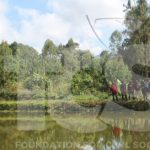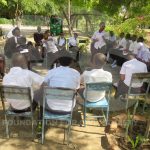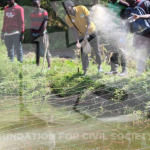Government, CSOs and community cooperation empowers Youth in Mbeya city
It is very possible to transform Youth into an effective workforce that is self-aware of its place and responsibility in a community and the country. And by using Civil Society Organisations (CSOs), this is possible from the ground up, beginning at the grassroots communities where most social ills and challenges are found. A very good example is that of Youth groups in Mbeya City in Tanzania.
Boaz Mwasipu, an entrepreneur from Mbeya is a very different young man compared to what he was two years ago. He ran a community waste collection initiative. He volunteered with the Gender Desk in his area on child protection campaigns. Together with other members in his Youth group, they produce different types of soaps and process and package fruits, vegetables and spices. Besides being in a youth group, he also buys and sells various products they produce. Boaz is a leader of his Inuka Angaza Youth group in Ilomba Ward, Mbeya and also serves as the chairman of a Forum of other groups from six Wards of the City Council.

Two years back, Boaz had nothing to be proud of. He and many other youths wasted time hanging out at street corners, susceptible to all social ills – drug abuse, alcoholism, theft and even sexually transmitted infections (STIs). This mainly resulted from lacking self-awareness. Most of these youths had basic Primary and Secondary education; and they lacked the necessary skills that would have increased their employability in the job market.
The most important question here is, how can a community transform Youths like Boaz, from being young people from community full of challenges with no hope and dreams for tomorrow, into self-aware, confident and innovative young entrepreneurs producing cleaning and agribusiness products, with dreams of investing and expanding their income generating activities (IGAs)? The answer touches three parties: community, CSOs and the Government.
CSOs, philanthropy and community volunteerism
Mama Tusekile Aggrey, (54), is the Chairperson of SHOP, a civil society organisation behind the success of Boaz and his other group members. Her story and where the SHOP started stems from local philanthropy.
“We started as just a saving group for six women and each one of us used to save Tzs 5,000 per month. We collected these contributions every month and at the end of the year we divided among ourselves what we have saved for a year. One day we decided to use our savings to host a special luncheon for orphans in our community. The event was quite an eye opener. It awakened our thirst to do even more for our community. We ended up founding SHOP” says Mama Tusekile.
SHOP’s theory of change follows a sequence of interdependent actions to build up outcomes. They target Youths in the community with coordinated awareness and education campaigns to transform their minds into a self-aware and involved section of the society quest to fight social problems and uplift the community.
They have been implementing development initiatives for some time now. For the past two years, SHOP received a grant and capacity development from Foundation for Civil Society (FCS) in order to implement a Youth Empowerment project in Mbeya City.
Civil society-Government cooperation
This initiative brought together CSOs and community stakeholders with government support through the Department of Community Development and the Youth Office at Mbeya City Council. They together assessed the situation on the ground and reviewed project’s plans and budget in order to align them with priorities set by the City Council and the government.
“These CSOs are like our indirect workforce. They help us a lot in our work of serving the citizens. I highly commend them for touching base with us before commencing implementation of the project. We re-assessed and reviewed plans, budgets and priorities together to make sure we are all on the same page” says Baraka Mronga, Youth Officer at Mbeya City. He attributes the success by Boaz and his fellow youth to close cooperation between the relevant Offices at Mbeya City and CSOs at all levels of implementation (city, Ward and street).
This is affirmed by SHOP Officers Amina Mwakalobo and Yusuph Simbaya. “We have been working so close with government Officers at Ward and city levels that at times it felt like we were government employees. The relevant offices at the City Council provided us with so much technical support and this helped a lot in project implementation” says Ms Mwakalobo.
Uplifting the Youth in Mbeya City
One key and crucial stage in the project was establishing six Ward Youth Forums and 11 subsequent Youth Groups. These afforded them space to engage in entrepreneurship activities. These platforms enabled the Youth to access various training and awareness campaigns regarding the National Youth Policy of 2007. These platforms reached 42 streets of Mbeya City. They also got training sessions on various life skills in order to awaken their interest in fighting poverty at their household and community levels.
The awareness and training sessions increased the Youths’ self-awareness and understanding of their rights and responsibilities according to the Policy. This includes how to access loan opportunities allocated for the Youth at Council level.
“CSOs have helped increase the Youth’s self-awareness and grasped issues of community volunteerism, leadership and innovation in problem solving” says Mr Ona Geofrey, Mbeya City Community Development Officer. He adds, “The Youth’s awareness, participating and involvement in the National Policy and development processes is a crucial gain. In addition, training sessions on necessary life skills such as saving, innovation in recycling and youth health issues increased their understanding of the environment. This was eye-opening an a key to where to start”
Outcomes of the tripartite cooperation between the community, CSOs and Government
“SHOP successfully mobilised Mbeya youth groups to participate in training, because they employed both theoretical and practical methods on various aspects of innovative income generation initiatives. Most participants were interested in especially soap making, fruits and spices preservation and packaging as well as recycling” says Elly Mwakaswage, Community Development Officer for Isyesye Ward in Mbeya.
He adds “It is so motivating that after various training, you start seeing all the challenges in your surroundings as opportunities and way out. This motivates Youth and push them towards the necessity of getting involved and participating in their community development processes” He believes that the Youth that are self-aware, confident and equipped with necessary life skills have a greater chance of success in making it in life and protect themselves from all the social ills resulting from peer pressure, such as drug abuse and alcoholism.
He advises SHOP and other stakeholders to partner with financial institutions in innovating new products specifically targeting the Youth and their entrepreneurship initiatives, particularly the start-ups that seek capital to expand already successful operations. “There is a need for specialised loans and financial services for this segment. The successes and outcomes from these Youth initiatives in Mbeya can push our government to do more to support this growth” says Mr Mwakaswage.
Boaz and his fellow members of Inuka Angaza Group (20 members) continue well with their income generating activities. By August 2019 their soap production capacity was 400 bars. They use palm kernel oil produced in Mbeya. They also produce liquid soap for cleaning households and hotels. Another soap producing group is Jitambuewhich has 9 members. On the other hand, Food Processing Group (Kikundi cha Usindikaji, 30 members) continues increasing their capacity to process and package peppers, pickles, spices and producing wines three times every month.
Lessons and challenges
Civil society’s role in Youth Empowerment initiatives have been well received and accepted in Mbeya City. This is more so in grassroots communities through working closely with LGAs. “More partnerships are needed in this work. We need to assess and research together, plan and budget in a participatory way and set priorities together. This will reduce resource wastage as a result of duplication by multiple implementers and misallocation of priorities” advises Mr Ona. He also advises that efforts should be put in the continuation of these initiatives after project duration end, otherwise they will lack proper ownership and coordination in the communities. “I think at this juncture we need to engage parents (adults) as well because these initiatives aim at improving the livelihoods at households and community in general. The parents have a solid footing in the communities” he adds.




